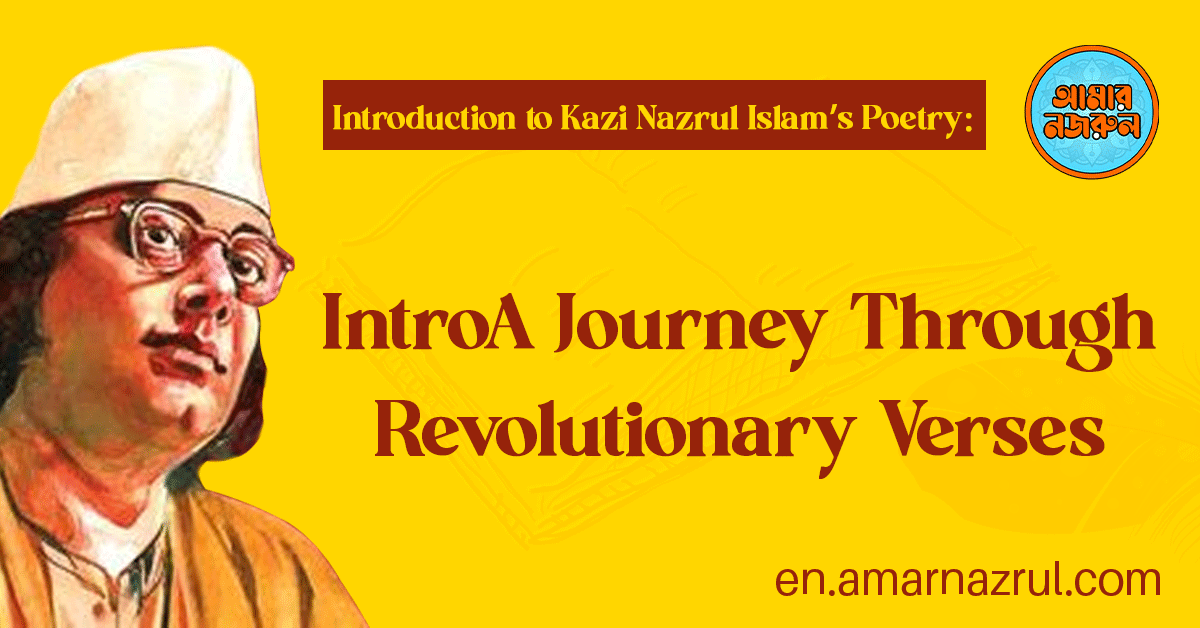Poetry, often referred to as the language of the soul, has the remarkable ability to capture the essence of human emotions, thoughts, and societal dynamics. Among the many influential poets that have graced the literary world, Kazi Nazrul Islam stands as a prominent figure whose poetry transcends time and borders. This article aims to provide an in-depth introduction to the life, works, and themes of Kazi Nazrul Islam, showcasing the profound impact his poetry has had on literature, culture, and society.
The Life and Times of Kazi Nazrul Islam:
Kazi Nazrul Islam, often lovingly referred to as the “Rebel Poet,” was born on May 25, 1899, in Churulia, a small village in Bengal, India (now in West Bengal, India). His life’s journey was characterized by struggles, passion, and an unwavering commitment to social justice. Growing up in poverty, Nazrul’s thirst for knowledge led him to become well-versed in various languages, including Bengali, Urdu, Persian, and Arabic.
His early years were marked by his involvement in the anti-colonial movement and his fervent opposition to social injustices. He joined the British Indian Army but soon found himself at odds with the establishment due to his outspoken views. Nazrul’s life took a significant turn when he published his first collection of poems, “Agni Veena” (The Flaming Lyre), in 1922. This marked the beginning of his poetic journey that would revolutionize Bengali literature.
Themes in Nazrul’s Poetry:
Kazi Nazrul Islam’s poetry reflects a profound amalgamation of themes that resonated deeply with his personal experiences and the socio-political landscape of his time. His works can be categorized into several key themes:
- Rebellion and Freedom: Nazrul’s poetry is a reflection of his revolutionary spirit. He vehemently opposed colonial rule and oppression, and his verses served as a rallying cry for freedom fighters. His poems like “Bidrohi” (The Rebel) and “Dhumketu” (The Comet) resonate with a fiery call for independence and human rights.
- Humanism and Equality: Nazrul’s poetry embodies a profound sense of humanism and egalitarianism. He championed the rights of the marginalized, including women, the poor, and the oppressed. His poems often depicted the struggles of common people and celebrated their resilience and strength.
- Love and Spirituality: Alongside his revolutionary fervor, Nazrul’s poetry also explores themes of love and spirituality. His verses exude deep emotions, depicting the various shades of love and the profound connection between human beings and the divine.
- Social Critique: Nazrul’s sharp wit and insightful observations enabled him to critique societal norms, religious orthodoxy, and hypocrisy. His poems often challenged established norms and invited readers to question the status quo.
- Nationalism and Identity: The themes of nationalism and identity were central to Nazrul’s poetry. He celebrated the cultural diversity of India while emphasizing the need for unity against colonial forces. His compositions inspired a sense of pride and unity among people from different backgrounds.
Influence and Legacy:
Kazi Nazrul Islam’s impact on literature, culture, and society is immeasurable. His poetry not only inspired individuals during his lifetime but continues to resonate with generations that have followed. His revolutionary spirit and unwavering commitment to justice left an indelible mark on the struggle for independence in India.
In addition to his poetry, Nazrul was also a prolific essayist, playwright, and composer. He composed numerous songs and became a significant figure in the realm of music, contributing to the development of Bengali music and cultural identity.
Conclusion:
Kazi Nazrul Islam’s poetry remains a beacon of hope, rebellion, and humanism. His ability to channel the collective aspirations of a nation through his verses is a testament to the power of literature to shape history and culture. As we journey through his revolutionary and timeless works, we are reminded that poetry is not merely words on paper; it is a reflection of the human experience, a catalyst for change, and a celebration of the beauty that resides within the depths of the soul.
